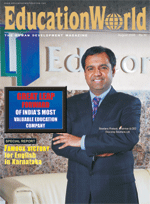Right place right time
 Thanks for your insightful cover story on Educomp Solutions Ltd (EW August). The company’s success story marks the beginning of an education boom in India. Education is the new sunrise industry and as Educomp’s chairman Shantanu Prakash says, it’s perhaps the only sector which is recession proof and non-cyclical. With over 450 million children under the age of 18 years, the market for private companies offering quality education products and services is huge. Educomp is in the right place at the right time.
Thanks for your insightful cover story on Educomp Solutions Ltd (EW August). The company’s success story marks the beginning of an education boom in India. Education is the new sunrise industry and as Educomp’s chairman Shantanu Prakash says, it’s perhaps the only sector which is recession proof and non-cyclical. With over 450 million children under the age of 18 years, the market for private companies offering quality education products and services is huge. Educomp is in the right place at the right time.
I was particularly impressed that the company has devoted a large amount of its monetary and human resources to research and development. Investment in developing new child-friendly pedagogies, products and processes is the real secret of Educomp’s success. The Educomp R&D team deserves special credit for developing India-specific curriculum content and innovating pedagogies to improve student-teacher classroom experiences.
Aditya Roychowdhury
Mumbai
Unimpressive reach
Your cover story ‘Great leap forward of India’s most valuable education company’ (EW August) was interesting and enlightening. India is home to a large community of teachers and students. Educomp’s products and services will definitely help them improve classroom productivity. But, with India boasting over a million schools, Educomp’s reach to a mere 7,500 government schools is less than impressive.
There is a huge digital divide in school education. While private schools offer access to sophisticated ICT facilities, government schools don’t even have computer and internet connections. The Educomp management must try and reach government schools situated in backward states such as Bihar, Orissa, Uttarakhand and Jharkhand, where adoption of modern technology in teaching and learning processes is very limited. This is a pre-requisite for it to emerge as a true all-India education company.
Sunita Sharma
Ranchi
Incalculable harm
Thanks for your well researched special report ‘Famous victory for English in Karnataka’ (EW August). Indeed, politicians and bureaucrats are doing great harm to the country’s education system. In Karnataka, politicians who are advocating the use of Kannada as the medium of instruction in primary schools, fail to realise that children studying in Kannada at the primary level, cannot suddenly switch to English medium at the secondary and tertiary levels. They suffer severe academic stress and are unable to adapt to an unknown language. That’s the real reason why so many students drop out in secondary school, and later on in college.
By not allowing new schools promoted after 1994 to teach in English medium, the Karnataka government has already done incalculable harm to the state’s economy and a great injustice to thousands of parents and children. It’s time it acknowledges its folly and accepts the Karnataka high court judgement allowing school manage-ments and parents to choose the medium of instruction. As it is, our education system is way below par internationally.
Sudha Iyer
Bangalore
Excellent editorials
I have been a regular reader of your pioneer monthly magazine for the past five years, and would like to thank you personally and on behalf of Indian society for this publication which casts an illuminating spotlight on the long-neglected education sector, and public education in particular.
As an avid reader of this (Mailbox) page, I note that you don’t seem to get any reader feedback relating to the excellent and thought-provoking editorials you write. This letter is to express my appreciation of the fresh and novel insights into national problems that you offer on this neglected page. It’s especially creditable that in your latest (August) issue you have questioned the pathetic performance of the public sector ONGC Ltd, whose crude oil output has stagnated for the past three decades despite huge resources being poured into the company.
I never miss your caustic Postscript page in which you have accused Hindustan Unilever, which markets Fair & Lovely skin whitening cream, of running a “deracination campaign”. However I am sure you are aware that HUL is not the sole vendor of skin whitening creams and lotions.
Sandeep Vakharia
Mumbai
Raise tuition fees
It was alarming to learn from Summiya Yasmeen’s cover story (EW July) that “the monthly tuition fee of a government aided college is equivalent to the price of a cup of coffee at a Café Coffee Day”. That Delhi University’s annual tuition fee has remained unchanged at Rs.180 for the past 60 years boggles the mind.
Since higher education is priced so low, government subsidies have to be quite substantial to pay for the actual cost of education. But, with the Central and state governments over-extended and running large fiscal deficits, higher education institutions are always cash strapped. This explains the deplorable quality of education today, and the large number of unemployable and unskilled students that colleges and universities certify every year.
Higher tuition charges are necessary for building collegiate infrastructure and hiring competent faculty. The public should accept this and support fee hikes, instead of blaming government for failure of the system.
Sharad Guha
Delhi